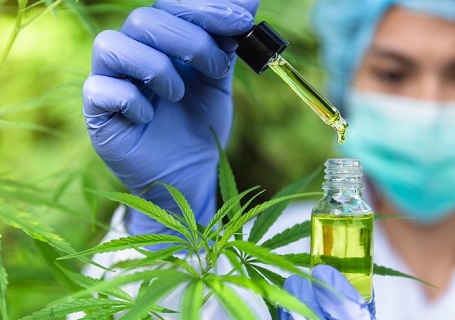Herb News: Canadian Research Shows That Cannabis Extracts Can Downregulate ACE2 Expression Hence Lowering Risk Of COVID-19 Infection
Source: Herb News Nov 28, 2020 4 years, 4 months, 3 days, 8 hours, 25 minutes ago
Herb News: Canadian researchers from University of Lethbridge, University of Calgary-Cumming School of Medicine, Pathway Rx Inc and Swysh Inc have in a new study found that extracts from
Cannabis sativa cultivars especially those strains rich in Cannabidiol (CBD) are able decrease levels of the host cell ACE-2 receptors that the SARS-CoV-2 coronavirus uses to gain viral entry to target tissues.

The study findings were published in the peer reviewed journal: Aging
https://www.aging-us.com/article/202225/text
The study team developed and cultivated hundreds of new
C. sativa cultivars and tested 23 extracts in artificial 3D human models of the oral, airway and intestinal tissues.
The study findings showed that the extracts downregulated expression of the SARS-CoV-2 host cell receptor angiotensin-converting enzyme 2 (ACE2).
Lead researcher Dr Olga Kovalchuk from the University of Calgary, Cumming School of Medicine told Thailand Medical News, “The observed down-regulation of ACE2 gene expression by several tested extracts of new
C. sativa cultivars is a novel and crucial finding.”
She added, “While our most effective extracts require further large-scale validation, our study is important for future analyses of the effects of medical cannabis on COVID-19. Down-regulation of ACE2 levels in gateway tissues may be a plausible strategy”
It is already known that the ACE2 receptor that SARS-CoV-2 and other coronaviruses use to access host cells is expressed in a range of tissues, including the lung, nasal mucosa, kidney and gastrointestinal tract.
A recent study reported high levels of ACE2 expression in oral epithelial tissues and suggested that the oral cavity could be an important target for prevention strategies.
Past research have also reported high levels of ACE2 expression in the lower respiratory tract of patients with chronic obstructive pulmonary disease (COPD). This patient group is associated with increased susceptibility to COVID-19 and more severe disease.
Dr Kovalchuk added, “The down-regulation of ACE2 levels in gateway tissues may thus be a plausible strategy for decreasing disease susceptibility.”
Cannabis sativa, particularly cultivars rich in cannabidiol (CBD), have previously been shown to alter gene expression and to possess anti-inflammatory and anti-cancer properties.
The effects of C. sativa on ACE2 expression has never been known until now.
HELP! Please help support this website by kindly making a donation to sustain this website and also all in all our initiatives to propel further research
t;>: https://www.thailandmedical.news/p/sponsorship
The study team developed more than 800 new C. sativa cultivars and extracts with approvals from the Health Canada agency.
The team then used artificial 3D human models to test whether 23 of the extracts that were high in CBD would alter ACE2 expression in target COVID-19 tissues.
Also given that inflammation is a significant component of viral disease, the researchers also examined the effect of the extracts on ACE2 expression in inflammation-stimulated 3D tissue models.
Utilizing artificial 3D human models of oral, airway and intestinal tissues, the study team identified 13 high-CBD C. sativa extracts that significantly downregulated the expression of ACE2.
In a model of airway tissues that had not been stimulated by inflammation, Western blot analysis identified six extracts that significantly downregulated the expression of ACE2 and two extracts that slightly upregulated its expression.
Interestingly in a model of unstimulated oral tissue, two extracts downregulated ACE2 expression, while three other extracts upregulated its expression.
The study team next examined a model of oral tissue that had been stimulated by treatment with the inflammatory cytokines tumor necrosis factor-α (TNF-α) and interferon-γ (IFNγ).
Detailed analysis by RNA sequencing showed that TNFα and IFNγ had upregulated mRNA levels of ACE2 in the oral tissue. However, all C. sativa extracts but one downregulated the expression of this altered ACE2 mRNA level.
Also in a model of inflammation-stimulated 3D intestinal tissues, two extracts significantly downregulated ACE2 mRNA levels, and in a model of stimulated airway tissues, all of the extracts attenuated the TNFα- and IFNγ-induced ACE2 expression.
Dr Kovalchuk added, “Utilizing artificial 3D human models of oral, airway and intestinal tissues, we identified 13 high-CBD C. sativa extracts that decrease ACE2 protein levels.”
The study team says that the findings provide a foundation for further analyses of the effects C. sativa may have on the pathogenesis of COVID-19 and other viral diseases where the ACE2 receptor is used as a molecular gateway.
The study team concluded, “If these results are further confirmed, these high-CBD cannabis extracts can be used to develop prevention strategies directed at lowering ACE2 levels in high-risk gateway tissues. The extracts of our most successful novel high-CBD C. sativa lines, pending further investigation, may become a useful and safe addition to the prevention and treatment of COVID-19 as an adjunct therapy.”
In June this year, Thailand Medical News featured an article in which researchers from Harvard Medical School, Northeastern University, Concordia University of Wisconsin and Vilotos Pharmaceuticals Inc, report in a study in which they identified Caflanone (FBL-03G) a flavonoid extracted from a rare strain of cannabis found in Jamaica called Black Swan that could hold therapeutic properties to treat COVID-19.
https://www.thailandmedical.news/news/breaking-cannabis-and-covid-19-caflanone,-a-flavonoid-extracted-from-a-distinct-cannabis-strain-could-be-a-therapeutic-drug-against-the-covid-19
There has been a few past studies that show that cannabis could possess certain antiviral properties as well.
https://www.ncbi.nlm.nih.gov/pmc/articles/PMC2903762/
https://www.karger.com/Article/FullText/509733
https://www.ncbi.nlm.nih.gov/pmc/articles/PMC3527984/
Researchers from the University of Nebraska and the Texas Biomedical Research Institute are recommending more research into how cannabis-derived CBD might help treat dangerous lung inflammation from the SARS-CoV-2 coronavirus. The authors detailed the evidence for how cannabis’ anti-inflammatory powers may help in a peer reviewed article in the journal: Brain, Behavior, and Immunity.
https://www.ncbi.nlm.nih.gov/pmc/articles/PMC7187842/
For more
Herb News, keep on logging to Thailand Medical News.
HELP! Please help support this website by kindly making a donation to sustain this website and also all in all our initiatives to propel further research: https://www.thailandmedical.news/p/sponsorship
